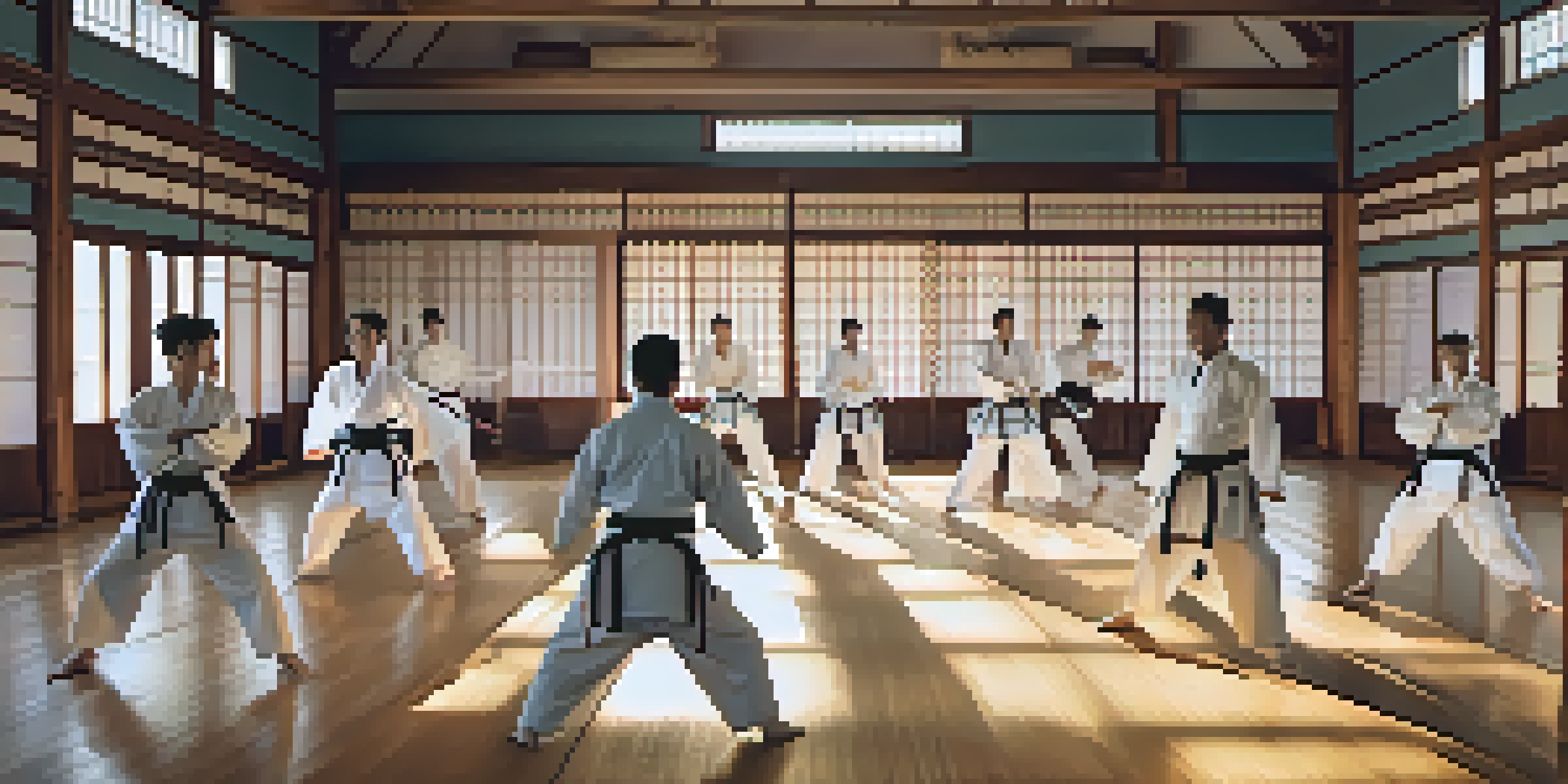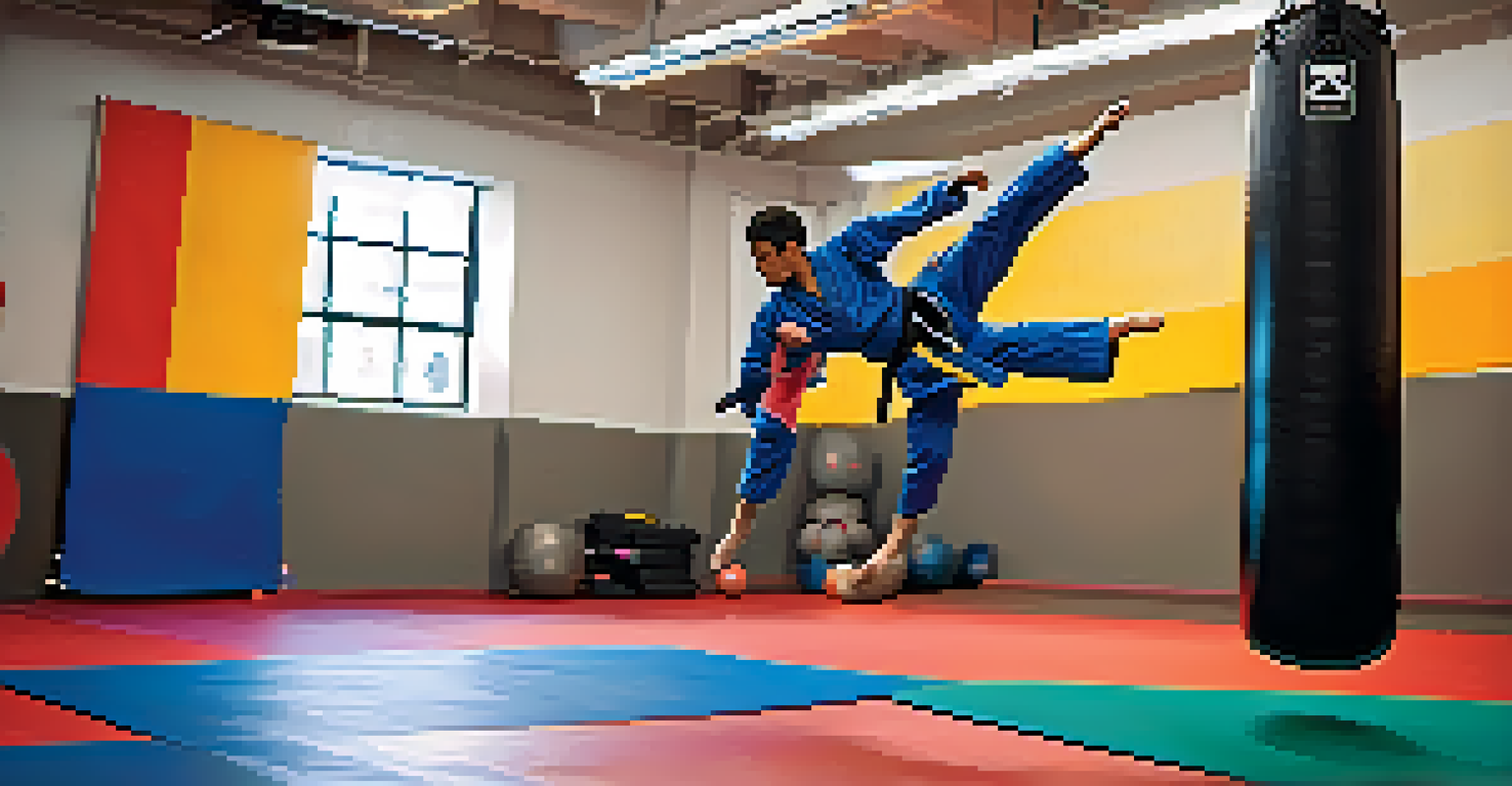Martial Arts and Emotional Regulation: A Healthy Balance

Understanding Emotional Regulation and Its Importance
Emotional regulation refers to our ability to manage and respond to emotional experiences. It's a crucial skill that affects our relationships, decision-making, and overall mental health. By learning to identify and control our emotions, we can navigate life's ups and downs more effectively.
The most difficult thing in life is to know yourself.
When emotions run high, they can lead to impulsive reactions and poor decisions. For instance, a moment of anger might result in regretful words said in haste. Developing emotional regulation helps us pause and reflect before reacting, ultimately leading to healthier interactions.
In today’s fast-paced world, mastering emotional regulation is more important than ever. It enhances our resilience, allowing us to cope with stress and build stronger connections with others. This is where martial arts can play a pivotal role.
Martial Arts as a Tool for Emotional Growth
Martial arts are not just about physical strength; they also emphasize mental discipline and emotional balance. Through training, martial artists learn to focus their minds and channel their emotions productively. This dual focus creates a unique environment for personal growth.

For example, when a martial artist faces a challenging opponent, they must manage fear, frustration, and anxiety. This practice of facing emotions head-on in a controlled environment helps individuals build resilience. Over time, these skills translate into everyday life, making emotional regulation more instinctive.
Emotional Regulation is Key
Mastering emotional regulation enhances relationships and improves decision-making.
Additionally, martial arts foster a sense of community and support. Practitioners often train in groups, encouraging each other and sharing experiences. This camaraderie can provide a safe space for exploring emotions, further enhancing emotional regulation skills.
Mindfulness and Breathing Techniques in Martial Arts
A key component of many martial arts is mindfulness, which involves being present in the moment. This practice encourages practitioners to tune into their bodies and emotions, fostering a deeper understanding of their mental state. Mindfulness can significantly enhance emotional regulation.
The mind is everything. What you think you become.
Breathing techniques, often utilized in martial arts, also play a crucial role. Controlled breathing can help calm the mind and body, making it easier to manage stress and anxiety. For example, the practice of deep breathing before sparring can help a martial artist focus and reduce nervousness.
By incorporating mindfulness and breathing techniques into training, martial artists develop a toolkit for managing emotions. This not only improves performance on the mat but also provides valuable skills for handling life's emotional challenges.
Building Confidence Through Martial Arts Training
Martial arts training instills a sense of confidence and self-efficacy in practitioners. As individuals learn new techniques and progress through their training, they gain a sense of accomplishment. This boost in confidence can significantly impact emotional regulation.
For instance, someone who has mastered a difficult kick might feel a surge of pride, which can counteract feelings of insecurity or self-doubt. This newfound confidence empowers individuals to handle emotional situations more effectively, knowing they have the skills to succeed.
Martial Arts Foster Resilience
Training in martial arts builds emotional resilience through discipline and community support.
Moreover, the discipline required in martial arts fosters a growth mindset. Practitioners learn to view challenges as opportunities for growth, which can reshape how they approach emotional hurdles in life.
The Role of Discipline in Martial Arts and Emotions
Discipline is a core tenet of martial arts, emphasizing the importance of consistent practice and self-control. This discipline extends beyond physical training; it also cultivates emotional control. A disciplined martial artist learns to respond thoughtfully rather than react impulsively.
For example, during a sparring session, a martial artist might feel frustration when faced with a skilled opponent. Instead of letting that frustration take over, discipline allows them to refocus and strategize. This ability to manage emotions in real-time is invaluable in everyday situations.
By developing discipline through martial arts, individuals can create healthier emotional responses. This structured approach to emotional regulation helps in personal and professional relationships alike.
Stress Relief Through Physical Activity in Martial Arts
Physical activity is a well-known stress reliever, and martial arts are no exception. Engaging in regular training sessions allows individuals to release pent-up energy and frustrations. This physical outlet can be immensely beneficial for emotional well-being.
For instance, after a long day at work, a martial artist might feel overwhelmed. A training session can serve as a reset, providing a space to channel stress into productive movement. This not only clears the mind but also enhances emotional clarity.
Mindfulness Enhances Performance
Incorporating mindfulness and breathing techniques in martial arts improves emotional control and overall well-being.
Moreover, the physicality of martial arts often leads to the release of endorphins, which are natural mood lifters. This combination of physical exertion and emotional release creates a powerful tool for managing stress and improving overall emotional health.
Creating a Lasting Impact: Martial Arts and Emotional Resilience
The benefits of martial arts extend far beyond the dojo. The emotional regulation skills developed through training can lead to long-lasting changes in how individuals navigate life's challenges. This resilience is crucial for personal growth and emotional stability.
For example, someone who practices martial arts regularly may find it easier to cope with setbacks, whether in their career or personal life. They learn to view obstacles as part of the journey rather than insurmountable barriers. This perspective shift can make all the difference.

Ultimately, martial arts provide a holistic approach to emotional regulation. By combining physical training with mental and emotional growth, individuals can achieve a healthier balance in their lives, leading to improved well-being and fulfillment.